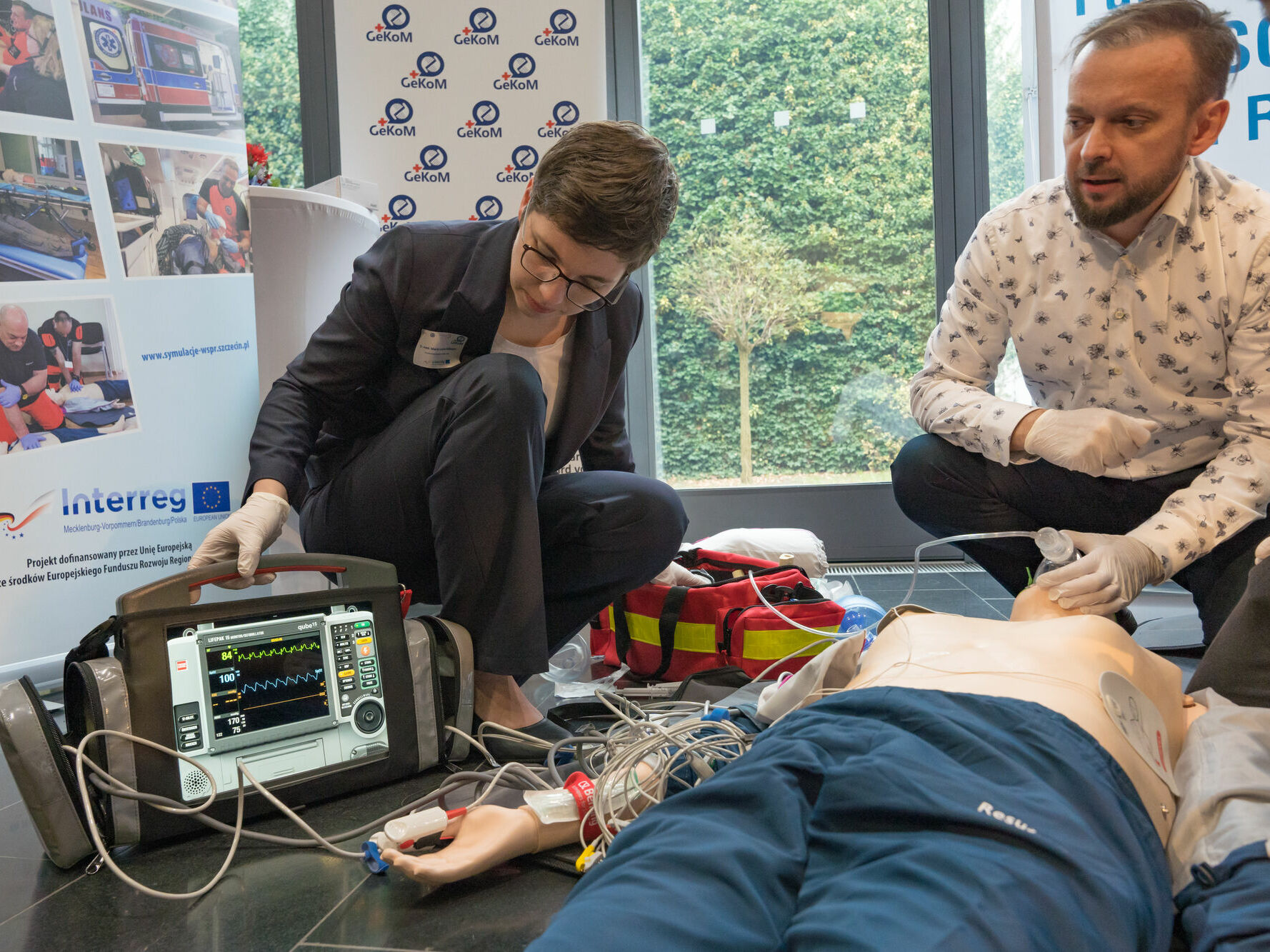Time is a decisive factor in emergencies. It is important that rescue services reach the patients as quickly as possible and bring them swiftly to the nearest suitable hospital for further treatment. Cross-border healthcare and, in particular, the collaboration between emergency services and A and E departments in the border region can help to prevent severe harm to patients’ health, such as a lasting neurological deficit following a stroke. Medical resources on both sides of the border must be accessible or made accessible to everyone, irrespective of nationality and whereabouts.
The development and consolidation of the communication skills of emergency medical staff in the emergency services and at the A and E departments was therefore at the heart of the GeKoM project and aimed to improve understanding between one another and the patients from the respective neighbouring country. The objective was achieved by developing an innovative tandem language and simulation training course, which was held at the joint simulation centre in Misdroy, Poland.
The joint language and simulation training course is based on European guidelines for diagnosing and treating various conditions in emergency medical situations. The primary aim of the communication training is to provide participants with practice-oriented communication skills as quickly as possible. The German-Polish tandem character of the training course makes it possible for participants to test their skills in real-time and to receive feedback on the correctness of their statements in the foreign language.
In addition, a communication handbook is being developed for those unable to attend the training course and as a source of information.
The activities of the GeKoM project will be completed by the end of 2022. Prof. Dr. Klaus Hahnenkamp, academic coordinator of the project and Director of the Clinic for Anaesthesiology, Intensive, Emergency and Pain Medicine at University Medicine Greifswald summarises: ‘The project has tested initial and innovative solutions for cross-border communication between members of the rescue services and has found effective solutions. It is now up to the politicians to implement sustainable systematic solutions in both neighbouring countries in order to enable the use of these solutions for successful cross-border emergency services that will benefit the patients.’ Prof. Dr. Steffen Fleßa, Chair of Management and Health Care Management at the University of Greifswald adds: ‘It is now essential to ensure that cross-border rescue services are not limited to emergency medical services, but should also include further players, such as the fire service, the lifeguard service and disaster management services. Furthermore, suitable political and financial support must be guaranteed so that the current project-related activities become the standard of unlimited collaboration between cross-border emergency services to provide the inhabitants of the border regions and the numerous tourists on both sides of the German-Polish border with the best possible care in emergency situations.’
Further Information
GeKoM project page [de]
GeKoM project page [pl]
Contact at the University of Greifswald
Prof. Dr. Steffen Fleßa
Chair of Management and Health Care Management
Faculty of Law and Economics
Friedrich-Loeffler-Straße 70, 17489 Greifswald
Tel.: +49 3834 420 2476
steffen.flessauni-greifswaldde
Contacts at University Medicine Greifswald
Dr. Marie-Luise Rübsam
Project management LP_1 project GeKoM
Clinic for Anaesthesiology, Intensive, Emergency and Pain Medicine
Ferdinand-Sauerbruch-Straße, 17475 Greifswald
Tel.: +49 3834 86 5649
marie-luise.ruebsammed.uni-greifswaldde
Dr. Dorota Orsson
Research Fellow
Language Didactics and Communication Models in Emergency Medicine
Clinic for Anaesthesiology, Intensive, Emergency and Pain Medicine
Ferdinand-Sauerbruch-Straße, 17475 Greifswald
Tel.: +49 3834 86 5641
dorota.orssonmed.uni-greifswaldde

